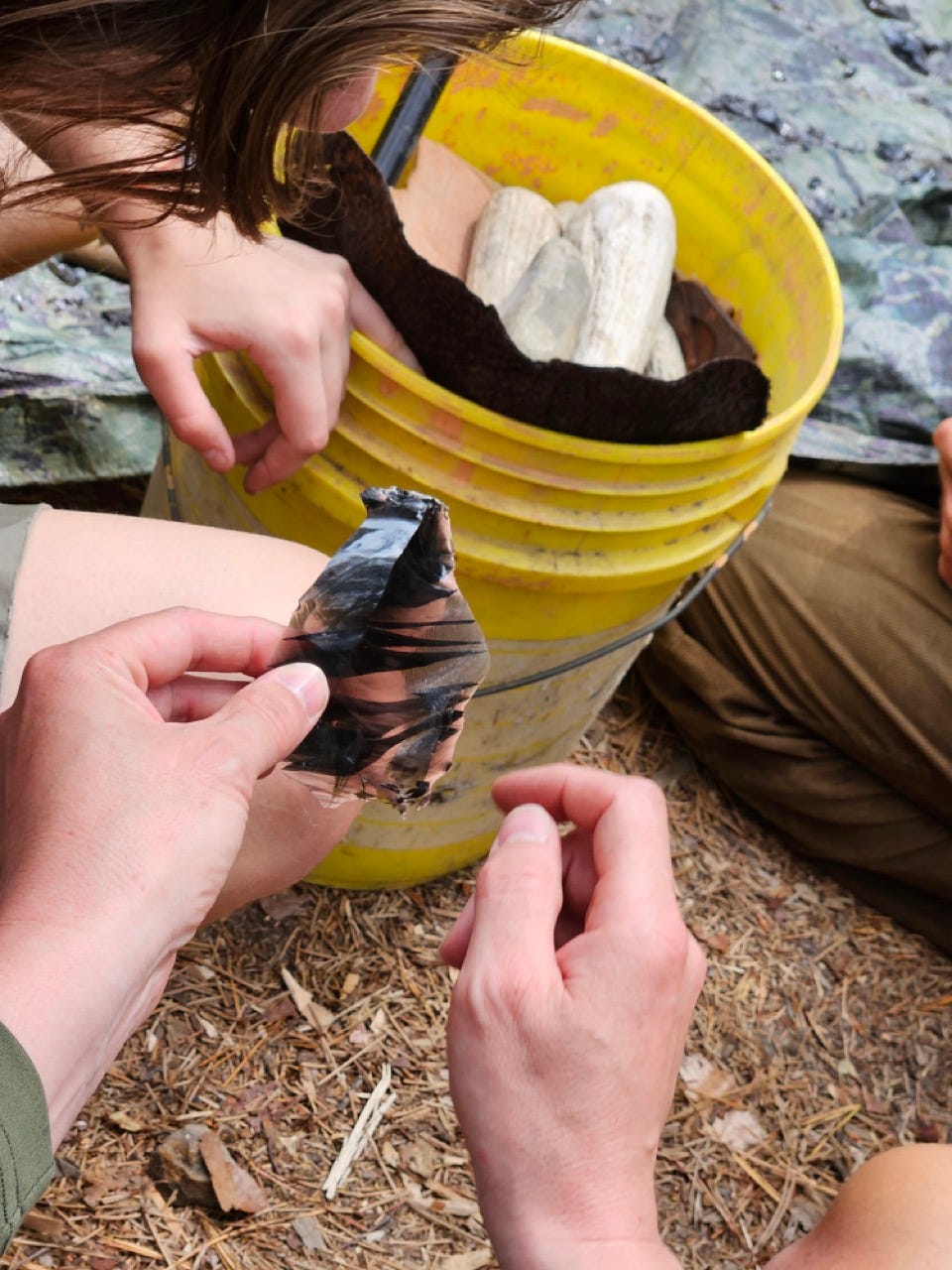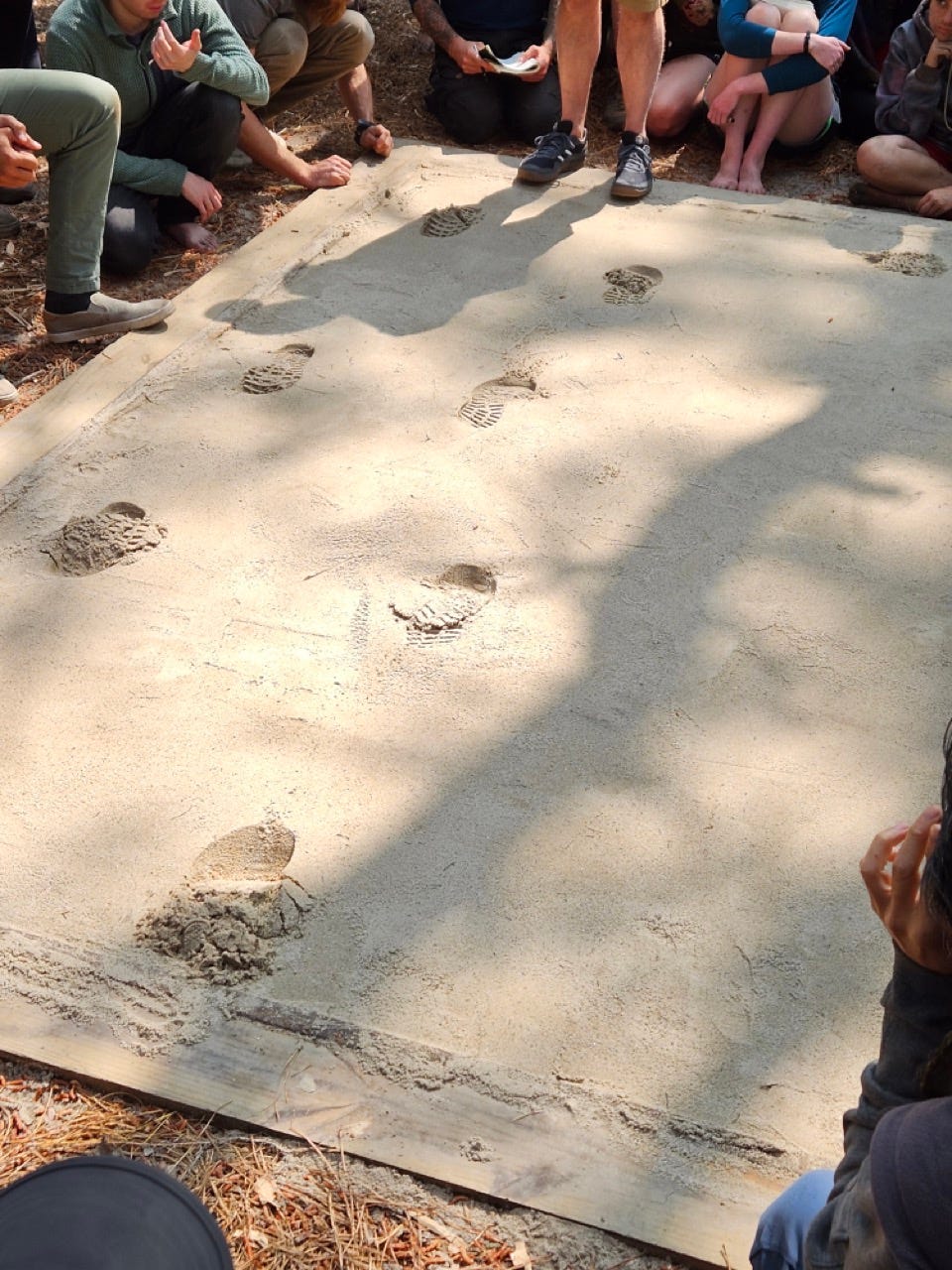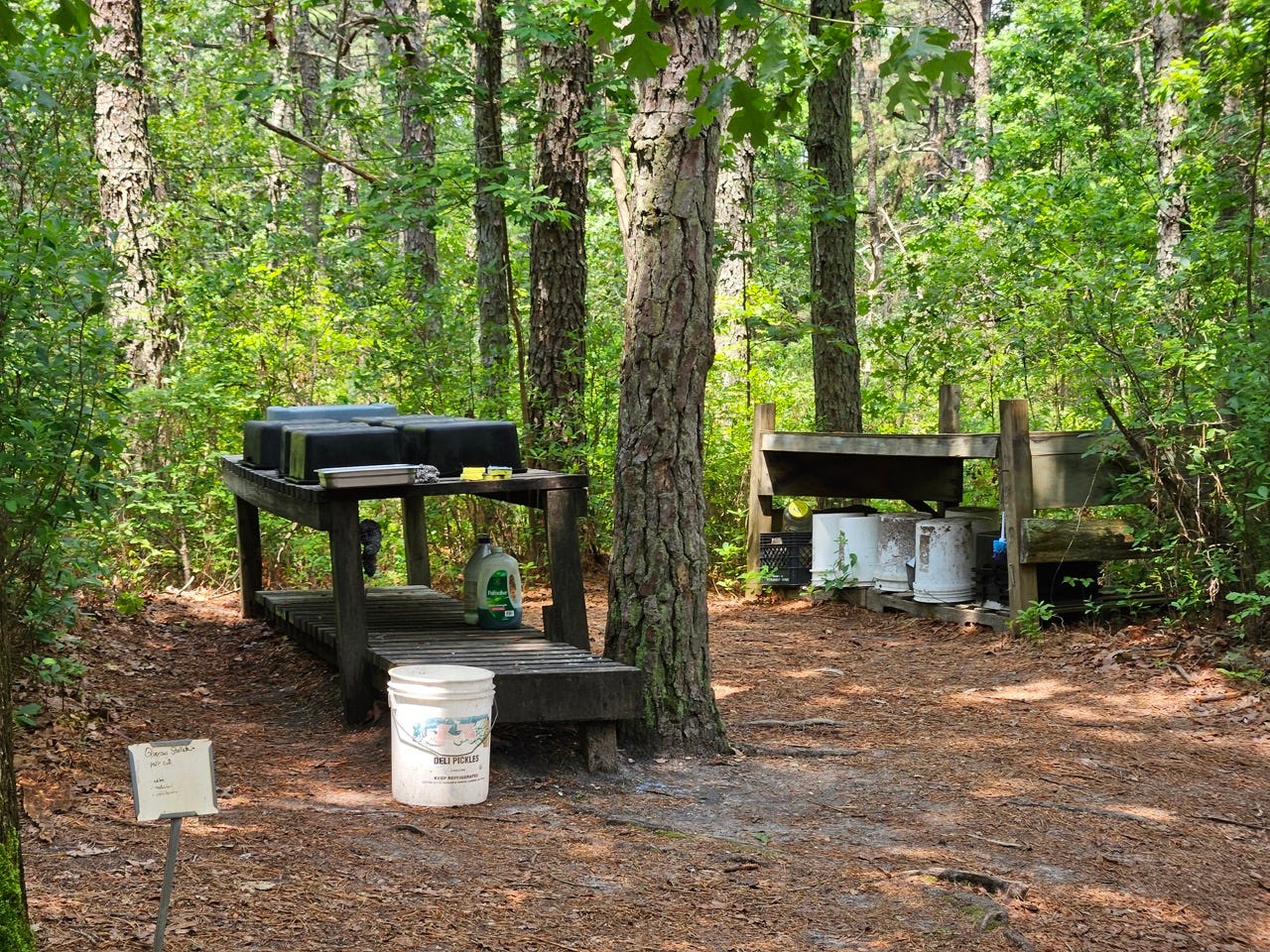Tracker School, first thoughts
Not Writing from Complacency, or The Ass-ive Voice
I spent the last week camping at Tom Brown Jr’s Tracker School in the Pine Barrens, a training program for primitive survival skills, tracking, and awareness that he has been teaching for over forty years. I will be writing about my time there in the coming weeks, as it was a life-changing experience. The caretakers, volunteers, and interns are a caring bunch, and this isn’t a macho exercise that mimics SERE school1 in the military; it is meant to introduce you to awareness, how to survive with nothing in a wilderness situation, to explain your place in nature and your responsibility as a child of the Earth, and to foster a respect and awe for both the world, and the immense repertory of knowledge that humans, especially indigenous peoples, have discovered over the millennia to both survive and thrive while treading lightly upon the Earth.
In practice, we were shuttled down bouncy backwoods roads to a rustic and beautiful encampment without electricity or running water. We found camping spots for our tents that were many yards apart and secluded by pine trees. We were not given comforts or amenities, but were not expected to suffer. They fed us well, there was a hut with first aid supplies and a medic, composting toilets and portable restrooms, shower stalls with buckets for lugging water from the nearby pristine stream, a pump well with crystal clear drinking water, and hand-washing stations to keep things sanitary.
And yet, it felt like a world apart. Tom Brown, Jr and his Tracker family have been running these classes for 45 years, and they are very good at it. Not just teaching, but organizing the meetup, and every aspect of a week in the woods, where you are learning from nine in the morning until ten at night, with short breaks and gatherings for meals. There are chores to be done and shared, but nothing dangerous. There are a lot of surprises, and I won’t reveal them here. Let’s just say that it’s not a macho exhibition of suffering, where you are encouraged to drink your urine to survive.
It would be very easy to write about this with disdain. How many articles have you read about someone who joins an excursion with people who have principles that clash with the voracious consumption of everyday life, and then returns home to sneer about it to a national magazine? Perhaps it began with Mark Twain and The Innocents Abroad, where he pokes fun at travelogues, but it’s so common as to be expected. I found myself composing it, because it would be very easy to poke fun at the mild discomforts from a position of a complacent member of society who laughs at people who live their principles.
I could totally put on a clown suit and write from the perspective of a lazy, entitled whiner who complains about a whippoorwill singing all damn night, a leaky tent, a sleeping pad that isn’t quite a Tempurpedic mattress, and sharing a dozen port-a-potties with seventy people. I could share my stumbles and clumsiness to chum up to you, so we could snicker at people who actually love living in the woods and eschewing the comforts of living on the grid.
But it is not writer’s job to make you feel comfortable.
It’s the opposite, in fact. Good ol’ Harlan Ellison, love him or hate him, had principles. I was honored to include a story of his in my anthology, Protectors 2: Heroes, and I had to jump through a few hoops to accommodate such. It was worth it. Harlan fought for writers endlessly, but he also demanded much of them. He said that it was a writer’s job to be a troublemaker.2 He said a lot more than that, but the point is that a writer is here to assail the comfortable and comfort the afflicted. To not only tell the emperor, empress, or emprum that they have no clothes, but to tell the subjects that their ruler doesn’t wipe well enough and may have genital herpes. Anyone else is selling their soul, writing to sell ad space for watches that cost more than a used car.
Humor and satire have their place, but at some point, certain comedians became a sort of police for the status quo. When the money got good. Which is why I think writers should keep their day jobs (but that’s another thing). The people I met at Tracker School were not rich people looking to rough it for a few days and feel like Bear Grylls. They were from all over the world. I taught a young Australian woman how to swear like a New Jerseyan, and washed the kitchen counter with an older woman from China. They were mostly younger, but some were older than me. And the caretakers told us to call them elders, and let them lead us to cook-fire at their pace. Because they walk the walk, at Tracker School.
Trust me, if there was a whiff of bullshit, of holier-than-thou, bluster, or any lack of earnestness, I would have pounced. But they took care of us, and there were no soapboxes. When Tom Brown, Jr spoke to us, his heart was wide open. I’m not here to judge him. It’s not my place. I felt honored to hear him speak, and would place him alongside naturalists such as Loren Eiseley, Jane Goodall, Farley Mowat, Robin Wall Kimmerer, and Barry Lopez in how he uses his voice and words to make people give a damn about the Earth.
Why do we find it so easy to sneer at the heartfelt, at those who do more than criticize, but walk the walk, and walk away from Omelas?
It’s so easy because we are kept from seeing the child working nights at slaughterhouses to bring us feces-infested hamburger patties, seeing the birds roasted alive by the invisible methane flames of refineries, the drowned and strangled sea life entangled in drift nets, and the people displaced centuries ago—and more every day—so that we can build house after house with clear-cut lumber on stolen land.
I don’t say that to make you feel guilty about it. I say it to make you uncomfortable.
Maybe you can’t truly walk away from Omelas, because human civilization nearly encompasses every place on Earth. But there are some who come close, and they do not sneer at those of us who can’t slough off the shackles of civilization and its cruelties. We like to imagine that they must; but I think most of them would be happy to help us take even the smallest step towards lives that tread more lightly, and consume less. One man invited us into his mandan hut, insulated with underbrush, that has kept him and his dog warm for nearly three years. It was a cozy, modest home.
We are not apart from nature. Matt Corradino, one of the caretaker instructors at Tracker School, who runs Mount Victory Camp with his wife Carmen—a plant expert and excellent instructor as well—implored us to see ourselves as part of nature. I have long described our urban sprawl as akin to grasshoppers becoming locusts, or beaver dams flooding a forest and ruining it for others. It is not “unnatural” but out of balance.
We don’t have to live in huts we built in the woods, heated by fire, to help diverge our future from the frightening path we now follow.
But we do have to care. Or we’ll all be lucky to be living in the woods, practicing our survival skills.
If you think indigenous wisdom is a crock, read this piece by Sara Sterley which touches on many things, but begins with how the Moken people used their wisdom to save themselves while others who lacked this knowledge perished. And this article on how indigenous children survived for 40 days in the Amazonian jungle after their plane crashed and killed all the adults on board. They used indigenous trackers to find them, and even they were surprised at how well they did.3
Survival, Evasion, Resistance, and Escape.
“My work is foursquare for chaos. I spend my life personally, and my work professionally, keeping the soup boiling. Gadfly is what they call you when you are no longer dangerous; I much prefer troublemaker, malcontent, desperado. I see myself as a combination of Zorro and Jiminy Cricket. My stories go out from here and raise hell. From time to time some denigrater or critic with umbrage will say of my work, ‘He only wrote that to shock.’ I smile and nod. Precisely.”—Harlan Ellison, in Danse Macabre edited by Stephen King.
Carmen Corradino told us that children under age 7 often have a better chance of survival because they rely on instincts, whereas adults keep pressing on and wandering in circles instead.










Thanks for sharing this. I read Tom Brown Jr.'s "The Tracker" when I was living a miserable existence in a hovel in one of America's many neglected urban centers (doesn't matter which--they're "all ugly in the same way.") It became a touchstone of my life, & following its advice, I became pretty good at spotting hidden animals, though not on the level of those instructors, but more than that, I finally got steered away from the mano-a-mano man-against-nature motif of "survival" culture vs. "traditional skills" culture. And as you point out, this attitude then extends to many corners of your life. He's done wonderful things for people.
And also, THIS: "How many articles have you read about someone who joins an excursion with people who have principles that clash with the voracious consumption of everyday life, and then returns home to sneer about it to a national magazine?"
Answer: far too many, including a particular best-seller about the Appalachian Trail written by someone who couldn't do it & presented that as a point of moral and mental superiority. Ugh. Sneering is not a good look, or a good way to live. A week or two away from it is always refreshing. Sincerity is cool, you know? I'm mostly done with anti-heroes for the same reason--been there, done that. It's a cop-out.
Peace.
Thanks so much for sharing, Thomas. I love the threads we’re both pulling on…excited to read more about Tracker School!